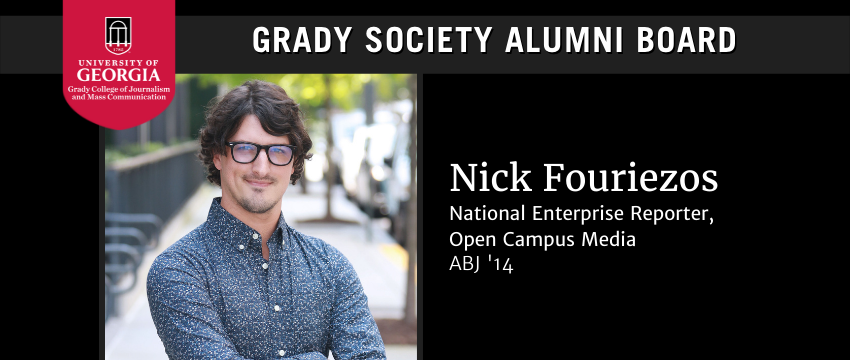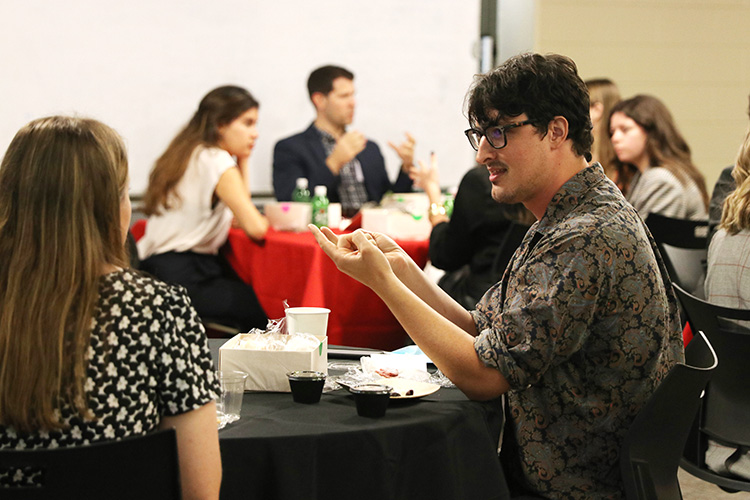Grady Society Alumni Board Profile: Nick Fouriezos

Grady Society Alumni Board Profile: Nick Fouriezos
We are grateful for the support and enthusiasm of our Grady Society Alumni Board members. This series profiles members of the alumni board who make a positive difference in our College.
Nick Fouriezos is a national enterprise reporter for Open Campus Media, where he covers the role of higher education in rural America. Before that, he served as OZY Magazine’s Washington D.C. correspondent for six years, covering two presidential elections and writing from six continents. In 2017, he created and led “States of the Nation,” a year-long reporting project where he spent a week each in all 50 U.S. states to spotlight under-covered communities and reintroduce people to their neighbors. A former editor in chief of The Red & Black, his byline has appeared everywhere from the New York Times and Baltimore Sun to USA Today, the Daily Beast, Atlanta Journal-Constitution and elsewhere. He can be found on Twitter @nick4iezos.
Grady College: Why is it important to you to be involved with the GSAB?
Nick Fouriezos: My time at UGA and at Grady set me on a path that I never could have imagined for myself while growing up and thinking that I would live a quiet life as an English teacher writing on the weekends. It was with the help of my classmates and my professors that I was able to learn how to interview, report and write — and also how to care, deeply, about my fellow journalists and the work they put in every day to seek the truth and report it. It’s important to me that I pass on that care, so that future Grady grads can continue to help create the first draft of history.
GC: What advice do you have for today’s Grady College students?

NF: Be committed to your purpose but be creative in the way you fulfill it. The way we tell stories about the world around us is changing rapidly, and those who are able to adapt regardless of medium will succeed. Work at The Red & Black and do internships! You won’t know if a newsroom is for you until you’re in one — and it’s OK if it’s not for you. The skills you learn here will transfer across industries, as powerful communication skills are a must at every organization. Finally, once you enter the workforce, diversify your revenue streams. Personal finance can be empowering when you allow it to be, and there is nothing more freeing than being able to pick and choose the work you do rather than be reliant on taking any project possible just to make ends meet.
GC: What experience during your time at Grady College had the biggest influence on where you are today.
NF: There is no substitute for hands-on experience. Journalism is less academic and more like blacksmithing; you learn with each strike of the hammer, each sword in the furnace. Repetition is key, so write as much as possible, and write in different genre: while at The Red & Black, I wrote and produced stories for the sports, variety, news and opinion sections, and each genre helped shape my reporting in different ways. When I first arrived at Grady, it did not seem like there was as much of an emphasis on tangible experience. Thankfully, programs led by people such as Keith Herndon, Vicki Michaelis, Welch Suggs and others have changed that, giving you the unique opportunity to commit real acts of journalism while still having the room for error, and growth, that an academic setting allows.
GC: How has the network of fellow Grady College alumni helped you in your career?
The Grady network has been huge. My old professors have been people I could rely on for advice, guidance and support even almost a decade after I left school. One of my most important career building blocks, my time at the Atlanta Journal-Constitution, was shaped by my friendship with Greg Bluestein, who convinced me to give political reporting a shot after having mostly covered sports. He also gave me great advice to pass on becoming a “forever intern” and instead become a freelancer in Australia and Indonesia, where I had amazing personal and professional experiences that led to me landing the job that shaped my career and helped me report from six continents and all 50 states. The Grady College alumni network gives me a home away from home…one that allows me to have a taste of Athens everywhere I go.
GC: What modern challenges would you like to see current students and recent College alumni solve?
How to find a sustainable business model for good journalism! Nobody has quite figured it out, although I think there is a lot of hope in nonprofit news, which can remove the profit incentive that drives so much of the content mills and combative, clickbait-driven coverage that exemplifies the worst parts of modern journalism. I also hope that current students and recent alumni absolutely reject the toxic work cultures and absurd expectations that have too long existed in media—particularly the noxious idea that because this is a calling for many, they should be willing to be paid less than their worth and work more than is healthy and sustainable. I hope they are brave enough to demand better, in ways that some of us did not or could not when we were recent grads. Finally, I’d like to see more journalism that is driven by empathy, that helps people better understand their neighbors—whether friend or foe—in order to better bring about meaningful change.